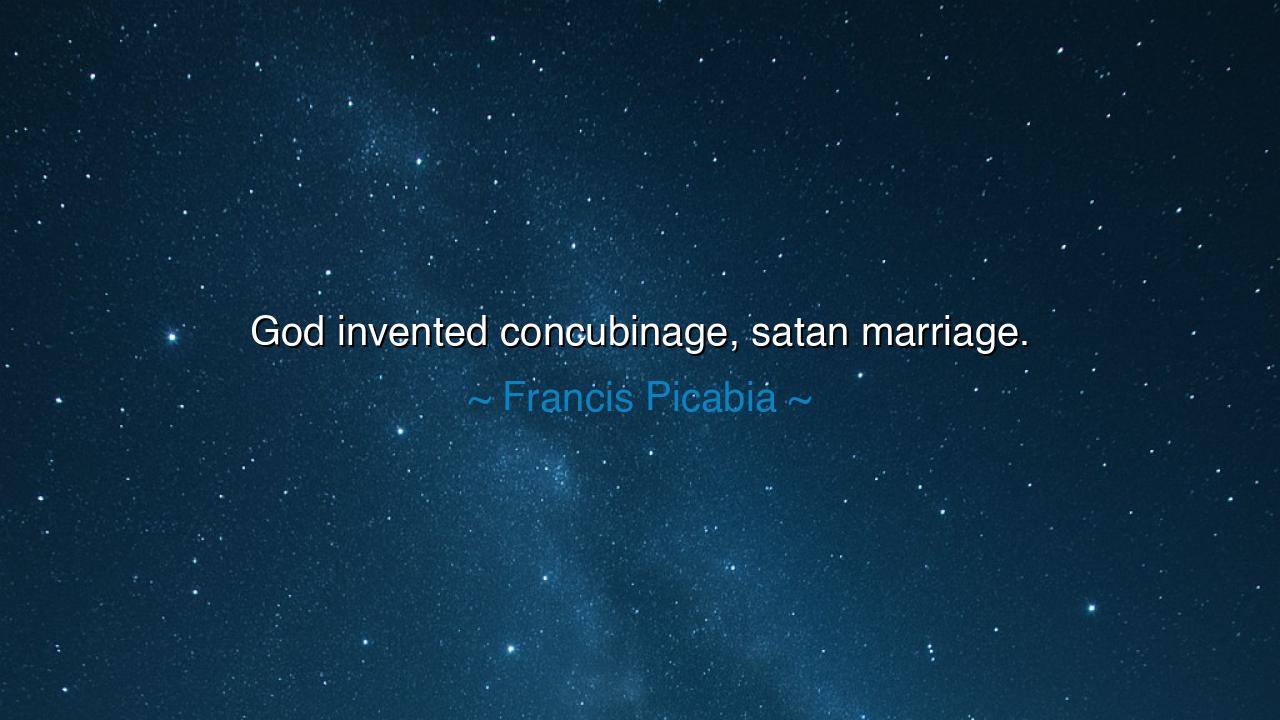
God invented concubinage, satan marriage.






In the depths of human history, where the sacred bonds of love and commitment have been revered and sanctified, there comes a voice that questions, that challenges the very structures that have long been in place. Francis Picabia, in his provocative words, speaks with a clarity that disrupts the conventional understanding of human union: "God invented concubinage, Satan marriage." This seemingly audacious statement invites us to explore not only the sacred and the profane but to dive deep into the very nature of human relationships—how they are shaped by divine will and human desire.
Concubinage, in the context of the ancient world, was not merely a relationship of convenience, but one that existed within the fluid dynamics of power, desire, and status. In many ancient societies, such as those in Rome or China, concubines were often women of lesser status who lived in a form of union with a man but without the sacred bonds of marriage. Yet, despite the absence of formal sanction, these relationships were often seen as deeply intimate and at times even more honorable than the institution of marriage itself, especially for those who chose such unions outside the dictates of society. In Picabia’s reflection, concubinage becomes a symbol of freedom—unburdened by the rigid structures and expectations that marriage often imposes on the individual.
Marriage, on the other hand, in the eyes of Picabia, represents something different—a human construct, a creation not of God, but of Satan. To him, marriage is the institution that imposes limitations, that binds people to an ideal of commitment and monogamy that can become burdensome, even destructive. In the grand sweep of history, marriage has often been used as a tool of control, a means of consolidating power and wealth, and of regulating not only love and affection but also societal order. It is a bond that is often broken by the very expectations it creates—expectations that can stifle the heart, demanding conformity and sacrifice at the altar of a perceived moral order.
The ancient Greeks, though they revered the institution of marriage, understood the complex dynamics of human relationships. They recognized the tension between love and duty. Plato in his dialogues speaks not of the mere contract of marriage but of the idea of the soul connecting with another in pursuit of the higher good. In the case of Socrates and his relationship with Xanthippe, marriage was a complex and sometimes strained bond, yet Socrates did not define his relationship solely by the strictures of marriage. Instead, his philosophy was one of constant questioning, constantly seeking the deeper truth and meaning behind human interactions. For him, the essence of any union, whether through concubinage or marriage, was not in the formalities, but in the growth of the soul and the pursuit of wisdom.
Picabia’s words remind us of a deeper truth—that the human heart is not bound by the expectations of others or the rituals that society dictates. Just as the ancients questioned the role of love and commitment, so too must we, in our modern age, understand that relationships are as diverse and fluid as the human soul itself. To Picabia, concubinage represents a form of freedom and authenticity, while marriage represents a prison, where people are often constrained by external forces that demand their conformity.
In our own lives, let us take this lesson to heart: relationships are not simply about conforming to social expectations, but about the freedom to connect with another in a way that honors both the individual and the union. Whether we choose the path of marriage, or decide instead to honor the deeper, more spiritual connection of concubinage, we must remain true to what serves our souls and hearts. Socrates did not follow conventional norms, and his relationship to philosophy and to others was one of deep integrity and authenticity. Similarly, we must find the courage to redefine our own relationships based on the principles of freedom, respect, and genuine connection.
So, the call to action that Picabia’s words bring forth is this: Do not live your relationships by the standards of others, or by the expectations imposed by society. Instead, seek the truth in your relationships, in your bond with your partner, and in your own heart. It is not the institution that defines the worth of the union, but the love, freedom, and growth that it enables. Let us not be imprisoned by conventional norms, but be guided by the pursuit of true connection, wherever that path may lead. For in the end, it is not the form of the bond that matters, but the integrity and authenticity with which we approach it.






AAdministratorAdministrator
Welcome, honored guests. Please leave a comment, we will respond soon